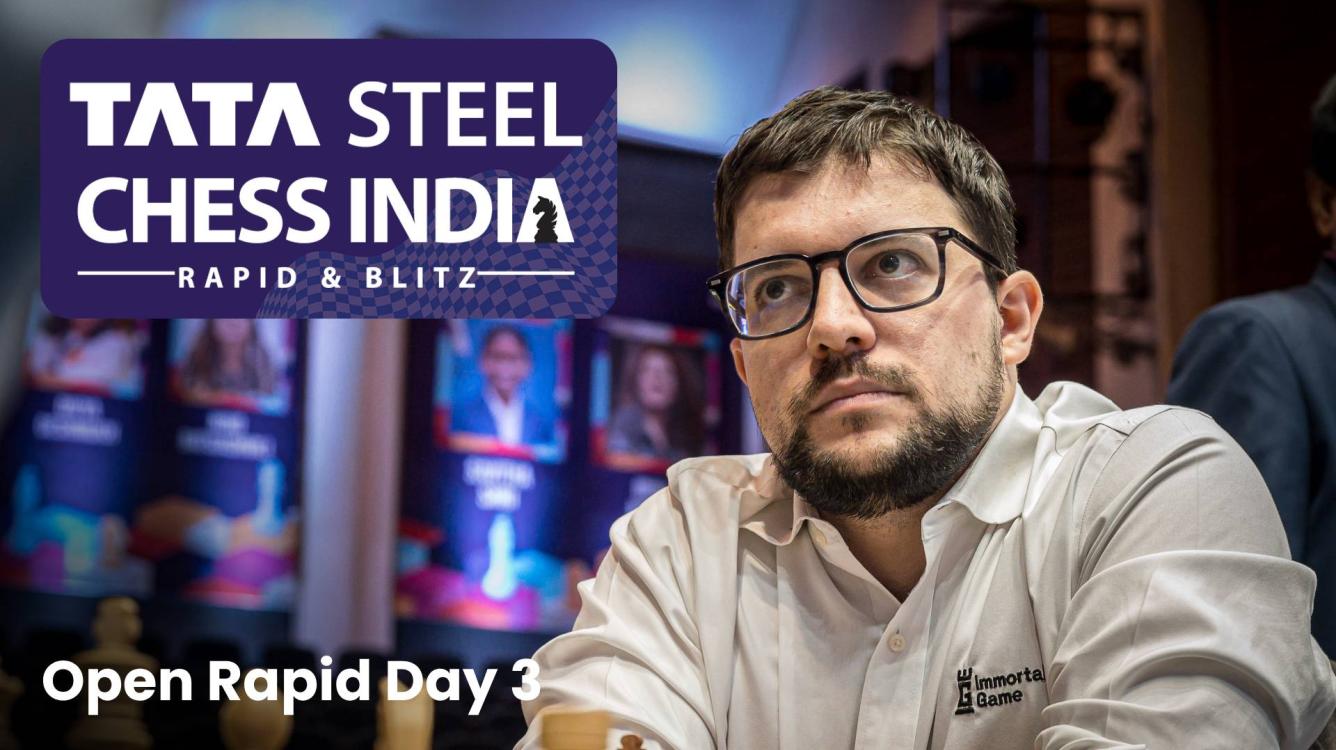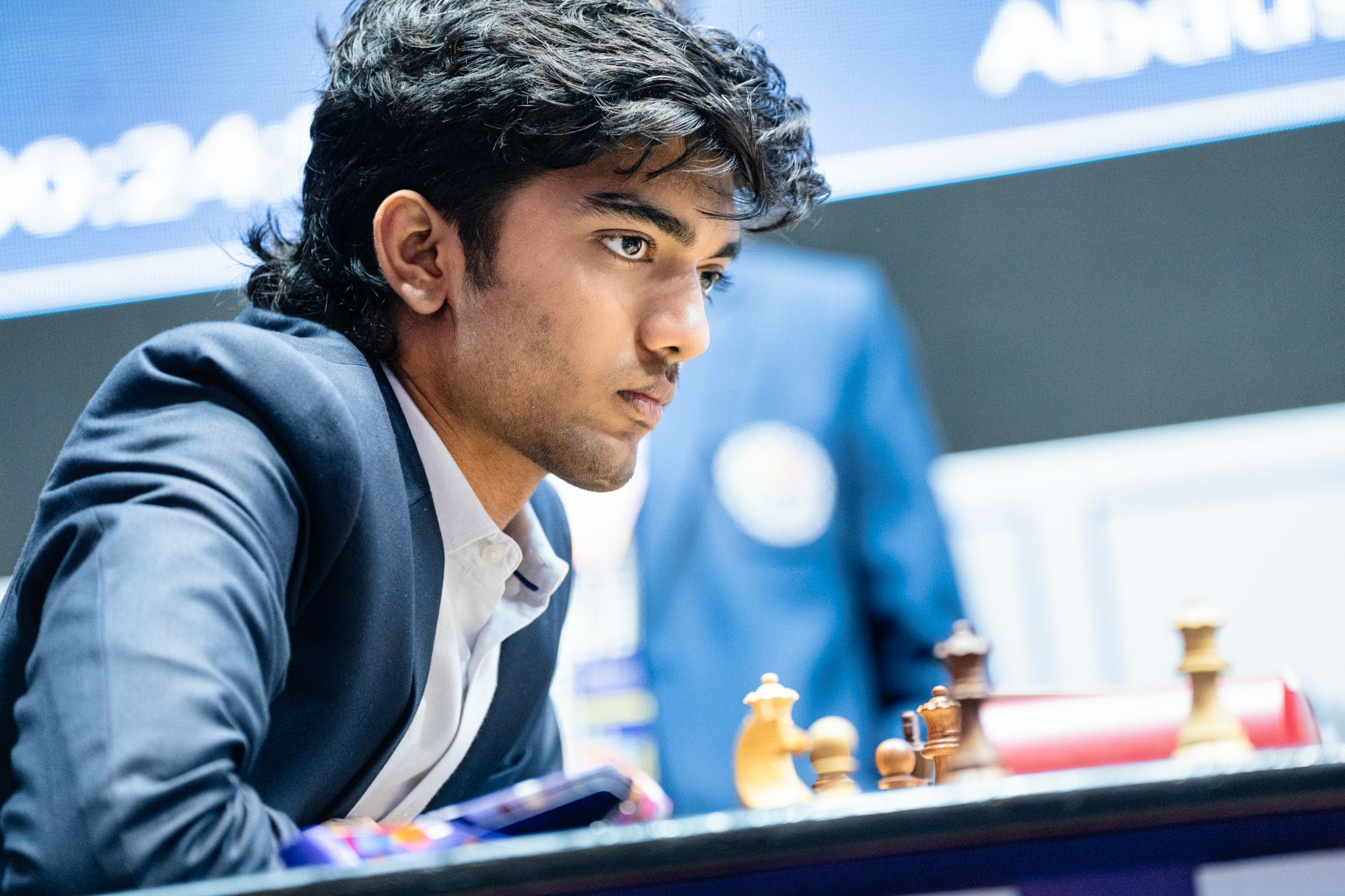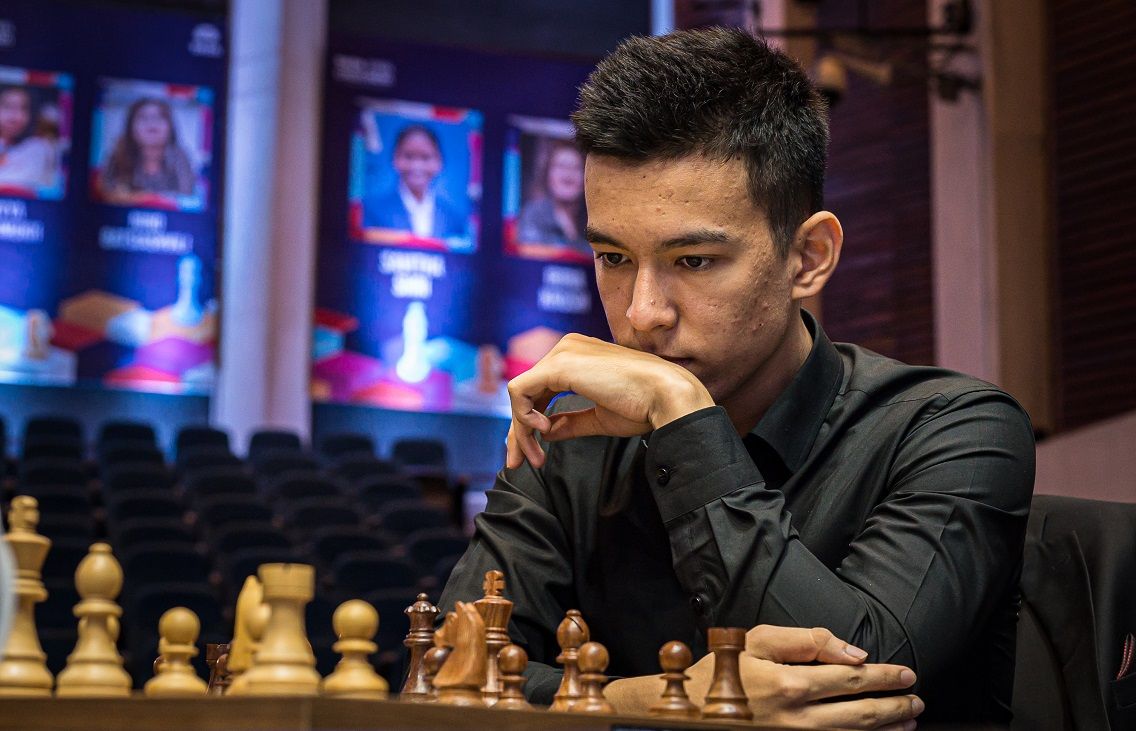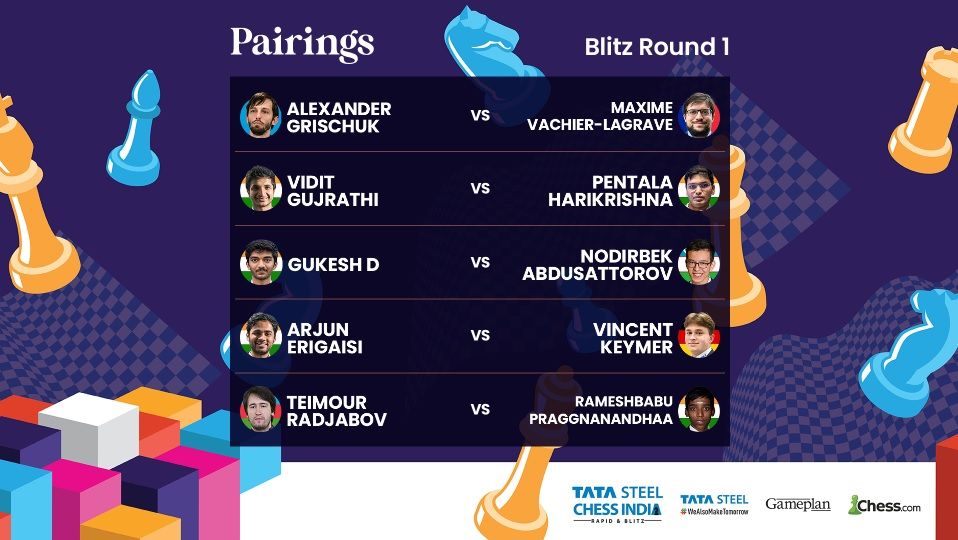
Smooth Round-To-Spare Rapid Title For Vachier-Lagrave
GM Maxime Vachier-Lagrave scored another 2.5 points on the last day of the 2023 Tata Steel Chess India Open Rapid, winning the event with a round to spare and scoring seven points out of a possible nine. GM Teimour Radjabov was placed second with 5.5 points.
After a day of intense fights, GMs Praggnanandhaa Rameshbabu, Alexander Grischuk, and Vidit Santosh Gujrathi finished in a tie for the third to fifth places, scoring five points each.
Vachier-Lagrave continued his exhibition of steady play from the earlier rounds, accounting for GM Arjun Erigaisi with the black pieces in the seventh round, winning an endgame arising out of a creatively played Petroff Defense. In the penultimate round, he avoided his favorite Berlin Defense endgame and opted for a strategic maneuvering middlegame against an out-of-form GM Pentala Harikrishna who blundered in a slightly worse position.
The Open Bltiz tournament commences on September 8 at 5:30 a.m. ET / 11:30 CEST / 15:00 IST.
How to watch the Tata Steel India Chess Open Rapid & Blitz
You can watch the event live on Twitch, as well as our YouTube channels for Chess.com and Chess24. Keep up to date with all the details of the tournament on our live events platform, and follow the games by clicking here.
The broadcast was hosted by GM Robert Hess and IM Tania Sachdev.
Vachier-Lagrave's Relaxed Play
Commentator Hess mentioned during the live broadcast that Vachier-Lagrave was a rare player in the tournament who would get up during the games to have a look at the other games or just to stretch his legs. Everyone else, with the exception of Grischuk, would be rooted to their chairs, preferring to concentrate on their games in such a short time control. Over the board too, he exhibited the airs of a consummate professional—relaxed, composed but concentrated.
On the last day of the rapid tournament, he brought the same attitude to his moves too. Following up with his excellently played endgame in the fourth round against GM Vincent Keymer, he once again won a complicated endgame against Arjun.
"... I was taking over this endgame against Arjun. Very pleasant—I don't know if he could have played something better. But it was tough for Arjun all along."
Such a big shift from playing the Sicilian Najdorf to the Petroff, is it to make his play stylistically more solid?
"No.... It is a different type of position of course. It is a bit about wanting your opponent to be unaware of where you actually want to go. With computers, it is not about style—it's about good moves. My game against Arjun was not solid at all. It was a full fight."
MVL's Tata Steel Chess India Debut: Pure Chess Magic! @Vachier_Lagrave’s first encounter with Indian chess fans has been a delightful blend of strategy, passion, and inspiration. Here's to an incredible debut! #TSCI #tsci2023 #tatasteelchessindia #chess #kolkata #mvl pic.twitter.com/niAuPgvR69
— Tata Steel Chess India (@tschessindia) September 7, 2023
And this mastery in endgames, how did it happen?
"I started working on endgames when I was a child. So, it [is] good knowledge of some theoretical endgames—not all of them because it is tough... And also, I have been calculating...all my life. Even outside chess, but let's stick to chess! Endgames are really a lot about calculation... One mistake in calculation [can] cost you the game in endgames, contrary to the opening."
In both his wins, Vachier-Lagrave's play wasn't flawless, but the opponents cracked under the stress, facing sustained pressure.
With Harikrishna, Vachier-Lagrave played purely strategically from the opening phase.
Before playing 28...Bf5??, Harikrishna calculated for more than three minutes, the final half a minute with head bowed down indicating blind visualization, and played it in a flourish. The move came as a surprise for Vachier-Lagrave also. "I took time, as I [hadn't seen] that move. Then I realized that I had 32.Qb1, and I just made sure that the geometry was working for me." But Vachier-Lagrave's reply came within a minute, indicating the fluency of his calculation to find such an important resource in quick time, and consequently his good form in the tournament.
There were more opening surprises on the third day too, and one of the most jaw-dropping moves of the day came from Grischuk: in the well-known 4.f3 variation of the Nimzo-Indian Defense, he shocked his opponent with a move that has almost never been played before.
What?!
Afterward, when Keymer quizzed about his intentions behind the move, the enigmatic Grischuk revealed a large body of analysis that went behind producing it.
So, however unhinged an opening deviation might look, nothing gets played before getting thoroughly analyzed.

The game between Arjun and Vachier-Lagrave described above itself produced a puzzling sequence of moves in the opening by Black.
For 5...Qd7!?, Arjun came up with 6.Nd4!? and Vachier-Lagrave nonchalantly answered 6...Qe7!?
But it turned out that Arjun had already played this position, and Vachier-Lagrave's confidence in adopting the variation came from having a predecessor in GM Fabiano Caruana.
"5...Qd7 was Fabi's move, and the point is that White cannot take on e4 now. So, sometimes this move comes in handy!"
So, you can play such moves confidently when you have illustrious predecessors who have adopted them before.
Praggnanandhaa produced one on the third move too, along such lines.
But, after nine moves, a perfectly acceptable Sicilian Scheveningen appeared on the board, which goes to prove that Praggnanandhaa always knew what he was doing.
So, sometimes the world might not understand the logic behind your move, but it's perfectly fine if you know what you are doing.
Overall, we are getting wiser.
Unlike Vachier-Lagrave, Radjabov had three draws in the day to claim his second place in the tournament. Toward the end of the last round, Radjabov joined GM Viswanathan Anand and Hess at the commentary box after his short draw against Vachier-Lagrave, and it was pure joy watching them let their hair down and have fun. All of them were in such good sync and mood that it consisted of many hearty waves of laughter and light-hearted ribbing of Radjabov the streamer.
Radjabov: "It's pleasant to play as Black. I mean, it's lost, but not too many pieces, so you just move around..."
— chess24.com (@chess24com) September 7, 2023
Anand: "It's lovely when you have no pieces because then you have no worries. No pieces, no cry!" 😂 #TataSteelChessIndia pic.twitter.com/nuPqPFeT3u
During the commentary, Radjabov did come up with insights on the field assembled, with so many top young players of the world: "It's also strange to play in this field...These guys are kids! I was only hearing about them. Fun to play with them in the same tournament—all these young stars...I always thought I would be the youngest of the field—I didn't manage!"
How did he see his result?
"I am just happy about the amount of decisive games I played in this tournament... [They] could go either way honestly, you also need some luck in some of the games, of course. This is rapid chess—once you get your luck in some games, you can perform very well. My biggest luck was my against Grischuk, of course... Not bad for a first time in this tournament."
The technical part of chess, what did he think he did well?
"I managed to play pretty well with small amounts of time. In many situations, including the game against Keymer, where the position was really unclear... In some of my games, I managed to find resources with just seconds left..."

And to the most important question, if he saw any similarity in the youngsters here? Stylistically or technically, just because they are young?
"They are having different styles. For example, Gukesh is very different from Pragg. Pragg is more technical in terms of his play.... He is more prone to convert slight advantages, putting pressure on the board. Gukesh is more tactical—a direct fighter. It is always the case in chess. Your character is different. The person you are is very different... Similiarity, for them, is that they do believe in engine evaluation in the position, rather than certain factors we will take into consideration. ..Like, Anand or Kramnik, they will care more about what they feel, rather than nowadays [when] you think about sacrificing a pawn because it is -0.91 or so."
The play of the younglings was the most awaited spectacle of this tournament. There were many uncompromising fights, and they went all out for wins whomever their opponents were. There were many delightful examples of such play, the best being the one between the youngster who upstaged Anand as the highest-rated player of the country after 37 years and the one who went to the very top of the 2023 FIDE World Cup to challenge GM Magnus Carlsen in the final.
GM Dommaraju Gukesh and Praggnanandhaa did not disappoint the fans, as they produced a brilliant clash, and the finishing stages of the game produced a rare and pleasing sight.
After a pseudo-sacrifice of his queen, Gukesh managed to advance two of his pawns to the seventh rank of the board, reminiscent of the romantic era of chess. This is our Game Of The Day, annotated by GM Rafael Leitao.

GM Nodirbek Abdusattorov produced a profound and only winning move even while short on time.
With only the final seconds remaining on his clock, Abdusattorov found the only way to win the position with 55.Kf5! when the natural 55.Kxe5? would have resulted in a draw. The logic was that, in the oncoming pawn ending, White needed to have the g-passer on the board to win the game.

All Games: Open Rapid Day 3
Open Rapid Final Standings

The Tata Steel Chess India Open Rapid concluded on Thursday with rounds seven to nine.
Open Blitz Pairings Round 1

The 2023 Tata Steel Chess India Men's and Women's Rapid and Blitz are two of India's most prestigious rapid chess events. The Women's event takes place before the Men's. Players compete in a 10-player round-robin in three days of rapid games with a 25+10 time control, followed by two days of blitz games played at a 3+2 time control.
Previous Coverage
- Day 7: Vachier-Lagrave Sole Leader Courtesy Of King And Knights
- Day 6: Four-Way Tie At Top After Combative 1st Day
- Day 5: Ju Wenjun Wins Dramatic Four-Horse Race To Secure Blitz Title
- Day 4: Harika, Ju Lead After Tumultuous Day
- Day 3: Divya Winner After Nerve-Wracking Finale
- Day 2: Divya Deshmukh's Dazzling Day
- Day 1: Deshmukh, Agrawal Leading With Power Play
- Inauguration: Star Players Kick Off Tata Steel Chess India


